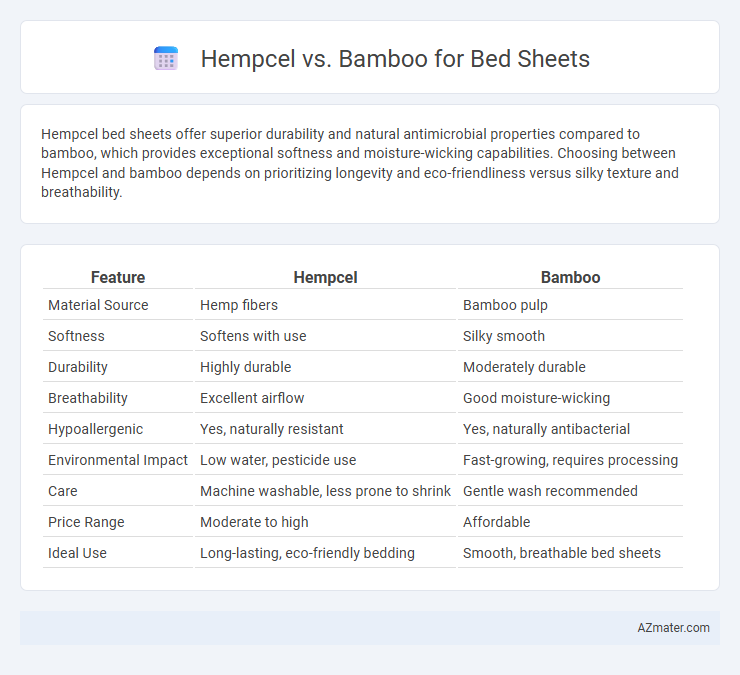Hempcel bed sheets offer superior durability and natural antimicrobial properties compared to bamboo, which provides exceptional softness and moisture-wicking capabilities. Choosing between Hempcel and bamboo depends on prioritizing longevity and eco-friendliness versus silky texture and breathability.
Table of Comparison
| Feature | Hempcel | Bamboo |
|---|---|---|
| Material Source | Hemp fibers | Bamboo pulp |
| Softness | Softens with use | Silky smooth |
| Durability | Highly durable | Moderately durable |
| Breathability | Excellent airflow | Good moisture-wicking |
| Hypoallergenic | Yes, naturally resistant | Yes, naturally antibacterial |
| Environmental Impact | Low water, pesticide use | Fast-growing, requires processing |
| Care | Machine washable, less prone to shrink | Gentle wash recommended |
| Price Range | Moderate to high | Affordable |
| Ideal Use | Long-lasting, eco-friendly bedding | Smooth, breathable bed sheets |
Introduction to Hempcel and Bamboo Bed Sheets
Hempcel bed sheets are made from hemp fibers processed into a soft, breathable fabric known for its durability, moisture-wicking, and antimicrobial properties, making them an eco-friendly choice for sustainable bedding. Bamboo bed sheets are crafted from bamboo pulp, offering a silky texture, excellent temperature regulation, and natural hypoallergenic benefits that enhance comfort and sleep quality. Both hempcel and bamboo sheets provide sustainable alternatives to traditional cotton, catering to consumers seeking environmentally conscious and health-focused bedding options.
Material Composition: Hempcel Explained
Hempcel bed sheets are crafted from a unique blend of hemp fibers and cellulose derived from wood pulp, creating a fabric that combines the durability of hemp with the softness of viscose. The material composition of Hempcel offers natural breathability, moisture-wicking properties, and is biodegradable, making it an eco-friendly alternative to traditional textiles. Unlike pure bamboo sheets that rely solely on bamboo fibers, Hempcel's hybrid composition enhances strength and resilience while maintaining a smooth, comfortable feel ideal for bedding.
What Makes Bamboo Fabric Unique
Bamboo fabric stands out in bed sheets due to its exceptional softness and natural moisture-wicking properties, making it ideal for temperature regulation and comfort. Its antibacterial and hypoallergenic qualities provide a clean and skin-friendly sleeping environment. Unlike Hempcel, bamboo's eco-friendly cultivation requires less water and no pesticides, enhancing sustainability alongside its luxurious texture.
Sustainability Comparison: Hempcel vs Bamboo
Hempcel bed sheets demonstrate superior sustainability through rapid growth with minimal water usage and natural pest resistance, reducing the need for pesticides and fertilizers. Bamboo sheets, while renewable, often require intensive chemical processing and significant water resources, impacting their environmental footprint. The biodegradable nature of both fibers contributes to eco-friendly disposal, but hemp's lower carbon footprint and less intensive cultivation processes make it the more sustainable choice for bedding.
Breathability and Comfort
Hempcel bed sheets offer exceptional breathability due to their natural moisture-wicking properties, making them ideal for hot sleepers. Bamboo sheets provide superior softness and a silky texture, enhancing overall comfort while also maintaining excellent airflow. Both materials ensure temperature regulation, but hempcel excels in durability and moisture management, whereas bamboo prioritizes a smooth, luxurious feel.
Durability and Longevity
Hempcel bed sheets offer superior durability due to hemp fibers' natural strength and resistance to wear, ensuring long-lasting performance even after multiple washes. Bamboo sheets provide softness and breathability but tend to have a shorter lifespan compared to hemp, as bamboo fiber can weaken over time. Choosing hempcel sheets prioritizes longevity and robustness, ideal for consumers seeking sustainable bedding with extended durability.
Hypoallergenic and Skin-Friendly Qualities
Hempcel bed sheets exhibit excellent hypoallergenic properties due to their natural resistance to dust mites, mold, and bacteria, making them ideal for sensitive skin and allergy sufferers. Bamboo sheets are similarly skin-friendly, offering softness and breathability with natural moisture-wicking and antimicrobial traits that prevent irritation and promote comfort. Both materials ensure a gentle, irritation-free sleep environment, with hempcel providing durability and bamboo delivering a silky smooth feel.
Care and Maintenance Requirements
Hempcel bed sheets require minimal maintenance, favored for their durability and resistance to mold and bacteria, needing gentle machine wash with mild detergent and line drying to preserve their texture. Bamboo sheets offer softness and moisture-wicking properties but demand careful washing in cold water and low-heat drying to prevent fabric weakening and maintain their silky feel. Both materials benefit from avoiding bleach and fabric softeners, but hempcel sheets generally withstand frequent washing better, making them ideal for those seeking low-maintenance natural bedding.
Cost and Affordability
Hempcel bed sheets tend to be more expensive than bamboo sheets due to the higher cost of hemp fiber cultivation and processing. Bamboo sheets are generally more affordable and widely available, making them a budget-friendly option for many consumers. The price difference reflects not only material costs but also differences in durability and sustainability aspects inherent to hemp and bamboo textiles.
Which is Better: Final Verdict
Hempcel bed sheets offer superior durability, breathability, and natural antimicrobial properties, making them an excellent choice for long-lasting comfort and hygiene. Bamboo sheets excel in softness and moisture-wicking capabilities, providing a silky feel and temperature regulation ideal for sensitive skin. For those seeking eco-friendly and robust bedding with long-term benefits, Hempcel is often considered the better option, while bamboo suits those prioritizing softness and silky comfort.

Infographic: Hempcel vs Bamboo for Bed Sheet
 azmater.com
azmater.com